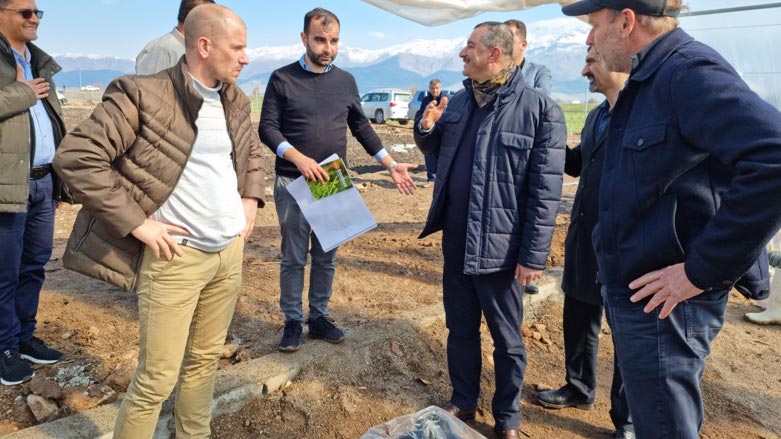Dutch Kurdish Agri City aims to produce local agricultural projects

ERBIL (Kurdistan 24) – Hans Akerboom, the Consul General of the Netherlands in Erbil, attended the recent opening of the Dutch Agricity in the Sayed Sadiq District of the Kurdistan Region’s Sulaimani Governorate.
Concrete support from the Netherlands to #KRI: Together with the governor of Suleymania, Dr Havel Abubaker, I was at the opening of Dutch Agri City in Sayed Sadiq. The Dutch Kurd Ranj Farhad, CEO of Gardenia, will grow lettuce, tomatoes and other vegetables with Dutch financing. pic.twitter.com/SCMpGzRar0
— Hans Akerboom (@jtmakerboom) February 15, 2022
Local officials from the Sayed Sadiq district, the Agriculture Ministry, and Sulaimani Governor Dr. Haval Abubaker also attended the event.
Ranj Farhad Beg, CEO of the Kurdish company Gardenia, told Kurdistan 24 that they aim to attract Dutch companies to start projects in a 3,000-acre agricultural field called Dutch Agri City.
The project is funded by the Dutch Foreign Ministry and supported by the Kurdish government.
“We already started with the Dutch company Marmix to plant conifer (trees). We also have a greenhouse project to produce lettuce and tomatoes, strawberries, and other food-related products,” Ranj Farhad Beg said. “Normally, conifer (trees) are imported from Iran and Turkey for millions of dollars, but we want to produce them ourselves, and it grows quite well here.”
“We also did market research on the quality, weather, and (arable) land three years ago, and we are planning to produce local produce,” he added. “Moreover, we are planning to create a storage and distribution center so we can distribute plants and products and sell them to the (local) market. We also plan to produce potatoes on a large scale.”
Akerboom earlier told Kurdistan 24 that the Dutch government wants to support the Kurdistan Region’s domestic agricultural production, calling it “healthy and cheaper.”
The autonomous region relies heavily on imports from neighboring Turkey and Iran to meet local demand.
The imported produce “is not as good as expected and is more expensive and is not so fresh anymore, so” the Kurdistan Region is producing its “own vegetables is much better, cheaper and is healthier,” he added.
Read More: Dutch-funded program signs second agreement to boost agriculture in Kurdistan
During the event, Akerboom said that this project also wants to limit the use of pesticides with the help of Ranj and the “support of his team” and produce local products to support the Kurdistan Region’s local economy rather than continually relying on imported products from neighboring countries.
Jeroen Hummel, who runs Kurdistan Trading BV / Hummel Export BV, told Kurdistan 24 that another goal of the Dutch Agri City is sharing knowledge with local Kurdish farmers through training by Dutch agricultural experts.
“We also want to build a higher education to create high-quality products and spread knowledge to people,” he said.
